Boxing clever
From humble beginnings, Woodland now claims to be the biggest manufacturer of kitchen, bedroom and bathroom cabinets in Northern Ireland. Managing director Brian McCloskey and his son Connor, the company’s sales and marketing director, tell Tim Wallace how major recent investment is helping drive further growth
Ask the trade press what they least enjoy when they visit manufacturers and they’ll usually tell you it’s the obligatory factory tour. So when I arrive at Woodland’s newly-extended HQ near Ballymena, Northern Ireland, it’s great to not only be spared this dubious pleasure, but to be treated instead to a three-course lunch prepared by a professional chef in a huge open-plan kitchen.
In truth, ploughing through plates of cured salmon, braised beef and almond sponge cake while trying to conduct a serious interview isn’t easy, but it certainly beats a cup of instant coffee in the back office.
Joining me are Woodland MD Brian McCloskey and son Connor who’ve clearly done a great job in growing the business from a tiny retail operation to what they now claim is Northern Ireland’s biggest manufacturer of kitchen, bedroom and bathroom cabinets. Back in 2010, turnover was just £1.6 million, now it’s nearing £17m and the aim is to grow this to £20m by 2020.
Launched in 1987, the company operated from a local showroom until 1990, when it moved to impressive 105,000sq ft premises amid the rolling County Antrim countryside. And last August, it proudly opened a two-storey product development and marketing suite, costing almost £4m.
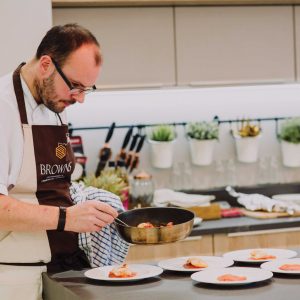
Customers range from major multiples and distributors to smaller retail operations. PJH, for example, has just agreed a deal on bathroom cabinets, although the pair are wary of revealing any other big-name partners. It’s all about giving them a “competitive advantage”, I’m told, but suffice to say “one is a FTSE 100 company”.
“A big thing for us was when Bernstein went [into administration],” Brian reveals. “What we’ve been doing is taking what was a Bernstein cabinet and trying to bring it back up to date again.”
Tour of duty
To earn my lunch, I’m first given a guided tour of the new showroom, which is partitioned into various lifestyle displays to show the depth of Woodland’s offering. “We were purely retail seven or eight years ago,” Connor confirms. “But we also have Laura Dallat Interiors. That’s the kitchen design side – that’s where we push the retail business, while we’re purely focused on trade and contract customers and distributors.”
The ground floor houses various kitchen and bedroom displays featuring both contemporary and more traditional ranges. “The architects are impressed, it gets them thinking,” Connor tells me. “Types of wood grains mixed with copper and different colours and mirrors is what they want to see. We even do an acrylic mirror. It’s board, but you can get the same look and it’s great for hotels.”
As the tour continues, I’m shown stylish student accommodation that’s a million miles from the poky room with a cracked basin I inhabited back in the Eighties. Then it’s on to hotel rooms with compact kitchenettes. “It’s all about upping the spec without spending too much,” Connor smiles.
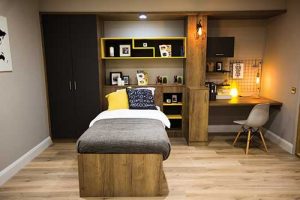 Upstairs is the spacious bathroom area. “We work with leading designers like Phil Allen, who’s worked with CP Hart, Jacuzzi and Bathstore,” Connor tells me. “He now helps us to design new furniture for customers that we can bring to life in CAD. We’re seeing a lot of Scandinavian blues coming through. There’s more of a rustic feel with a textured wood grain as opposed to smooth.”
Upstairs is the spacious bathroom area. “We work with leading designers like Phil Allen, who’s worked with CP Hart, Jacuzzi and Bathstore,” Connor tells me. “He now helps us to design new furniture for customers that we can bring to life in CAD. We’re seeing a lot of Scandinavian blues coming through. There’s more of a rustic feel with a textured wood grain as opposed to smooth.”
The company is supplied by Egger, which Brian says plays a big part in leading the colours and textures. “It’s no different from the clothes industry with its autumn and spring ranges. We have to move quicker now. We’re not scared of new colours. Some people let showrooms go for eight or 10 years without a change.”
As we sit down for lunch, it’s soon clear that innovation and flexibility are the Woodland watchwords. There’s also a determination to avoid “me-too” products that fail to excite its growing list of customers.
But Brian admits new partnerships have to be fought for, such is the growing level of competition in the market: “We were trying to do some business with Moben,” he recalls. “They didn’t know who we were, but eventually we got a meeting. The Moben guy had a price list of what he was buying his cabinets for. Mine were at £47 and my competitor was at £41. When I told him I could prove my 47 was cheaper than his 41, he thought I was on drugs!
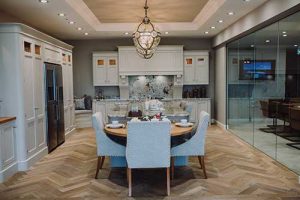 “So I asked him what the value of his stock was – it was £600,000 and it was taking up 25,000sq ft of space in Manchester. It also needed eight people to modify his cabinets. I said right, get rid of the eight people, put your 600 grand back in the bank and use your 25,000sq ft in a better way. The guy’s mouth dropped, but within 10 days they were on this site and within another week we were in the process of doing a deal.”
“So I asked him what the value of his stock was – it was £600,000 and it was taking up 25,000sq ft of space in Manchester. It also needed eight people to modify his cabinets. I said right, get rid of the eight people, put your 600 grand back in the bank and use your 25,000sq ft in a better way. The guy’s mouth dropped, but within 10 days they were on this site and within another week we were in the process of doing a deal.”
The pair also exude a sense of optimism about the state of the market, despite the headache of Brexit. “There’s a lot of unknowns there,” Brian admits, “but at this stage we’re not concerned. It will sort itself out. Probably the only thing is how the pound has been devalued. It’s the products we’re buying in where we’re seeing the price increases. So if there’s a negative, that’s where it’s coming from.”
Price increases
Raw material costs have increased, Connor adds, but that situation has stabilised in the past four or five months. However, Brian admits it’s still having a big effect. “At one stage, the euro against the pound was 75p, now its 88p, so you’ve got 10% to try to make up on your inward goods. Over the past two years, we’ve passed the costs on.”
Egger is Woodland’s main board supplier, but the company is being invoiced in sterling through the Hexham office. “The problem is,” Connor explains, “they’re buying the papers and resin from Europe, so there are increases there, but it could be a lot worse if all our board had come from Europe.”
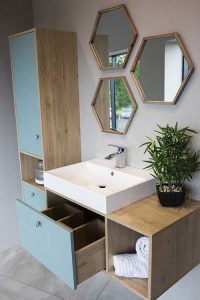 The overall strategy, he adds, is to have eggs in plenty of baskets. “We’re seeing good growth, but in the contracts side it’s well spread between apartments, hotels and residential. We’re not focusing on one area, we’re trying to keep the risk spread, even across student accommodation.”
The overall strategy, he adds, is to have eggs in plenty of baskets. “We’re seeing good growth, but in the contracts side it’s well spread between apartments, hotels and residential. We’re not focusing on one area, we’re trying to keep the risk spread, even across student accommodation.”
As you’d expect, the pair are also eager to champion the quality of their products over those produced elsewhere in Europe. “People are trying to get the German look in to their brand,” Connor says, “but I think the quality of the product we’re making is every bit as good as what the Germans are making. For example, our product would certainly be more rigid. German products will have 4mm, sometimes 8mm backs, ours would be 18mm.
“It’s about keeping an eye on what’s happening. One of the German showrooms we looked at had the same colour of cabinet the whole way through the showroom. That goes back to the inflexibility of their manufacturing process. They’re not the most flexible people in the world.”
Brian agrees, adding that there can also be lead-time issues with European brands: “One of our customers has German kitchens in its range, but the product has become very similar. The UK retailer has to check, double-check and triple-check what they’re sending before it leaves Germany because, if they get it wrong, it can take four weeks to get a replacement.”
Service is also key, Brian adds: “Faith are a good example of that – they’re very fast. They came out of the ashes of Mark II, whose brochure was just a mess. It was eight years dated. It didn’t tick any boxes, but you look at Faith’s brochure today and they’re being much more inspirational about how they’re thinking.”
 We’ve debated recently why KBB suppliers seem reluctant to export, but Woodland takes a different view: “We’ve supplied kitchens out to Saudi Arabia,” Connor counters, “again for a student campus, and we’ve supplied kitchens to Australia. But we’ve seen that many opportunities closer to home that that’s our main focus.”
We’ve debated recently why KBB suppliers seem reluctant to export, but Woodland takes a different view: “We’ve supplied kitchens out to Saudi Arabia,” Connor counters, “again for a student campus, and we’ve supplied kitchens to Australia. But we’ve seen that many opportunities closer to home that that’s our main focus.”
Brian agrees, although he’s now planning a more concerted look at the export market. “Within another year, we won’t be too far away from how you need it packaged and delivered in the right way,” he says. “I’d be targeting the Netherlands first. I’ve added up the cost of labour and what we could achieve and it ticks a lot of boxes for us. We have nice products here for the UK, but change the colour and the label and there’d be no problem selling in the Netherlands.”
Ultimately, the company is keenly aware of the need to keep driving growth.
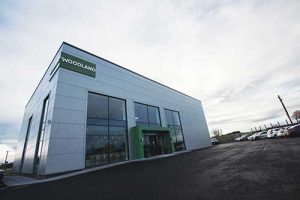 “We’ve got a three-year plan,” Brian explains. “The key thing is getting turnover to £20m. Then you keep going. You don’t sit back and relax. So many companies think they’re at the front edge and then start slipping. We’re talking to a major distributor in the south of Ireland. We just need to get machinery up and running. But we have an idea of the people we want to target. Investing in new machinery will drive us through to 2020 and work on a 20,000sq ft storage area will start in the middle of March.
“We’ve got a three-year plan,” Brian explains. “The key thing is getting turnover to £20m. Then you keep going. You don’t sit back and relax. So many companies think they’re at the front edge and then start slipping. We’re talking to a major distributor in the south of Ireland. We just need to get machinery up and running. But we have an idea of the people we want to target. Investing in new machinery will drive us through to 2020 and work on a 20,000sq ft storage area will start in the middle of March.
“It’s about not being scared of change,” he concludes. “Move and move quickly. And try to become a leader, not a follower in everything you do.”
- Main image: Woodland managing director Brian Mccluskey (right) with son Connor, the company’s sales and marketing director